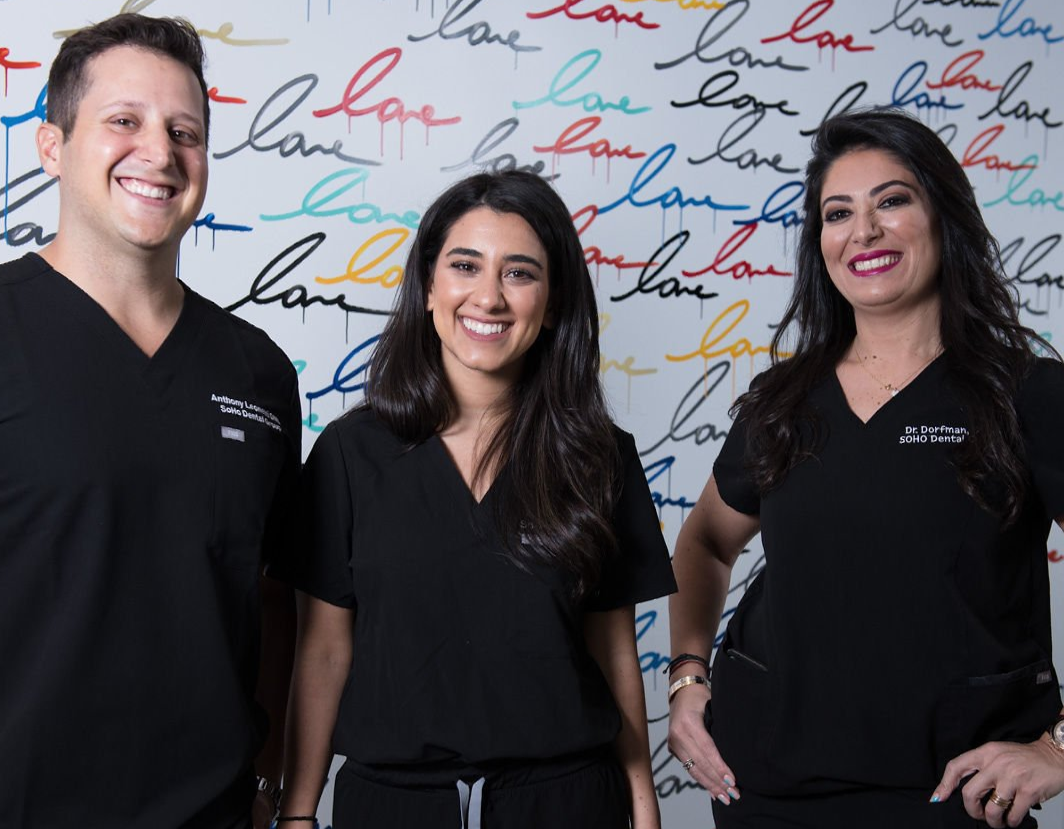552 Broadway, Suite 505
New York, New York 10012
Gap Teeth: Closing the Distance for a Confident Smile
Up to 25.4% of people have some form of a diastema between the front teeth or elsewhere in the mouth. Some people see this as a unique feature, but it makes others feel subconscious. For the latter, there is hope for a lasting solution.
With advancements in dentistry, correcting gap teeth is now more accessible and effective than ever. Ready to close the distance and achieve a confident smile? Explore your options for gap teeth treatments with SoHo Dental Group.
What Is Gap Teeth?
Gap teeth, also known as diastema, refer to the space between two or more teeth. While it can occur anywhere in the mouth, it's most common between the two upper front teeth, known as midline diastema.
The condition affects both children and adults, often closing naturally when permanent teeth come in. However, for some, the gaps remain and become a cosmetic concern.
In most cases, gap teeth are harmless and don't affect oral health. However, larger gaps may cause speech issues or difficulties with biting. Additionally, if caused by gum disease, it could be a sign of deeper oral health problems requiring treatment, such as periodontitis.
For those seeking to improve their smile,
cosmetic dentistry offers a range of solutions. Treatments are available to fix dental gaps, from non-invasive options like Invisalign to more permanent fixes like implants.
Invisalign for Gap Teeth
Invisalign is a clear aligner system that is popular for treating gap teeth. Unlike metal braces, Invisalign trays are nearly invisible. They're a great choice for adults who want to improve their smile without the look of traditional braces.
The custom-made trays slowly shift your teeth over time, closing gaps comfortably and discreetly.
Can Invisalign Fix Gap Teeth?
Yes, Invisalign can close gap teeth in many cases. If your gaps are caused by misalignment, the aligners can move your teeth to close the spaces.
However, if the gaps are due to missing teeth or severe issues, Invisalign may not be the best option.
In such cases, treatments like dental implants or veneers might be needed. Before starting, it's important to consult with your dentist to know if Invisalign is right for you and what to expect.
What Affects Invisalign Success?
Several factors can affect how well Invisalign works for correcting gap teeth. Smaller gaps, usually under 3mm, can be closed in about six months, while larger gaps might take longer. The location of the gap also matters -- front teeth often move faster than back teeth.
The shape of your teeth can play a role too, with some shapes moving more easily than others. For a deeper dive into the process, check out these things to know about Invisalign.
Why Choose Invisalign?
Many patients prefer Invisalign for dental gap correction because it's nearly invisible and much more comfortable than traditional braces. You can also remove the trays to eat, drink, and clean your teeth, which makes daily life easier.
Plus,
Invisalign offers predictable results in a shorter time for most people. If you want a treatment that combines convenience, comfort, and aesthetics, Invisalign is an excellent choice.
Braces for Gap Teeth
Braces gradually shift your teeth into the correct position using brackets, wires, and bands that apply gentle pressure. Over time, this pressure moves the teeth closer together, closing the gaps. Braces can also address issues like overbites and underbites, making them a versatile treatment.
How Braces Work
After an initial assessment, your orthodontist will apply the appropriate type of braces based on your needs. The braces consist of several components, including metal or ceramic brackets that attach to each tooth and archwires that connect them. These wires guide the teeth into position by applying continuous, mild pressure.
As your teeth move, the bone around them reshapes to support their new alignment. During treatment, regular visits to your orthodontist ensure that the braces are adjusted to maintain the correct pressure and promote proper movement.
Types of Braces
There are several types of braces available to close gaps between teeth:
- Metal braces: Traditional and highly effective, these braces use durable metal brackets
- Ceramic braces: Similar to metal braces, but made of a tooth-colored material that blends in with your teeth, making them less noticeable
- Lingual braces: These are placed on the back (inner) side of your teeth, making them virtually invisible from the front
- Clear aligners: Like Invisalign, these are removable trays that slowly move your teeth into place
All types of braces can correct gap teeth. However, the best choice depends on factors like your budget, aesthetic preferences, and the severity of the gaps, so consult a dentist beforehand.
FAQs About Gap Teeth Treatments
With proper care and regular adjustments, many gap teeth treatments are effective solutions for long-term dental health. Learn more from these FAQs.
Can Gap Teeth Affect My Oral Health?
In most cases, gap teeth don't cause serious oral health issues. However, larger gaps may lead to problems like difficulty chewing or speech issues. If the gaps are caused by gum disease, it could indicate more serious conditions, like periodontitis, which requires treatment.
How Long Does It Take to Fix Gap Teeth With Braces?
The treatment time varies depending on the size of the gap and the method used. For smaller gaps, braces can close them in as little as six months. Larger gaps or more complex cases may take up to two years.
What's Better for Closing Gaps - Braces or Invisalign?
It depends on each specific case. Braces might be better for more severe cases, while Invisalign is a great option for smaller gaps and those who prefer a more discreet treatment.
Will Gap Teeth Return After Treatment?
With proper care and the use of retainers post-treatment, the results from braces or Invisalign are typically long-lasting. Your orthodontist will advise you accordingly.
Ready to Fix Your Gap Teeth?
SoHo Dental Group is committed to helping you close your gap teeth with personalized care and expert solutions like Invisalign, braces, and more.
As the trusted choice for dental care in New York, we prioritize both your dental health and overall well-being. Our team is here to guide you on your journey to a confident, radiant smile.
All you have to do is
schedule your consultation with SoHo Dental Group, and let us create the smile of your dreams.
Our Primary Service Areas
Content reviewed by the
Home / Meet the Doctors / Services / New Patients / Reviews / Contact
516-701-2062
All Rights Reserved | SoHo Dental Group


